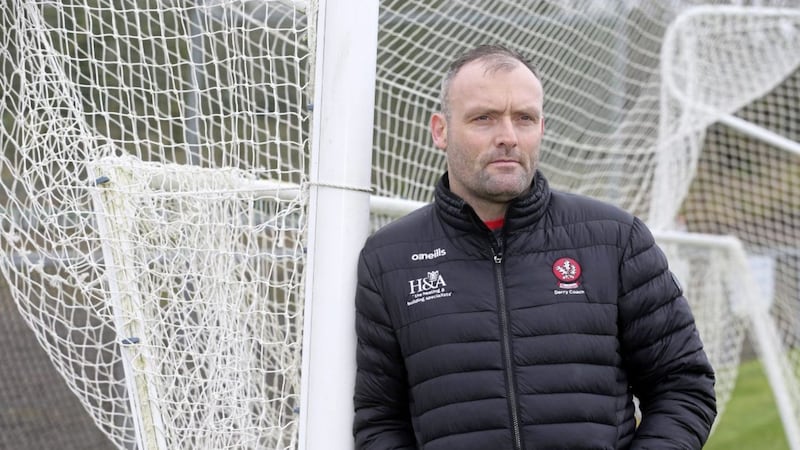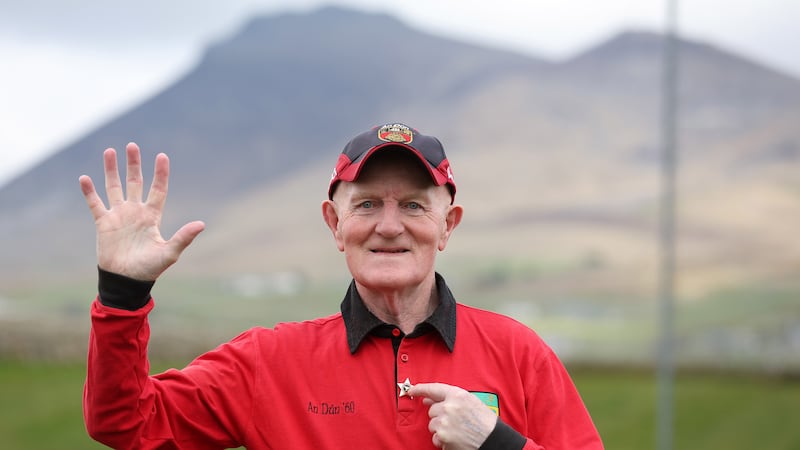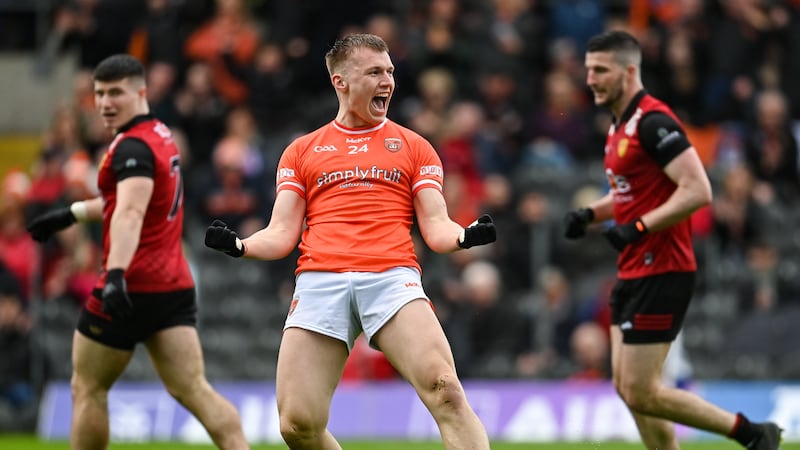‘Paddy Bradley danced under the bright lights of Celtic Park on Saturday night and left the crowd howling for more. After picking off seven points to help beat bitter rivals Tyrone, Bradley indulged his public in the dying seconds by juggling the ball three or four times, soccer style, near the sideline.
‘It might have been a bit cheeky, but the crowd loved him for it – and he loved them. Of course, Bradley’s playful juggle didn’t sit too well with his marker Conor Gormley. If only looks could kill.
‘Philip Jordan didn’t take too kindly either to Bradley’s playing-to-the-crowd. Bradley, though, was unfazed. He was the king of Celtic Park and no amount of growling and angry stares was going to spoil his evening.’ – The Irish News, April 7 2008
THE maverick in him, Paddy Bradley couldn’t resist. As the National League Division One game against Tyrone drew to a close with the Red Hands already slain, Bradley collected the ball in the middle of the field and did something that came back to haunt him later that year.
In the full glare of the Celtic Park press box, he juggled the ball before a pack of angry Tyrone players raced towards him.
Before any Red Hands could get near him, referee Joe McQuillan blew his final whistle, and by doing so almost certainly averted a fist fight between rivals that would’ve gone on until midnight.
Earlier, Bradley had produced yet another glowing archive of his incredible marksmanship in a Derry jersey, scoring 0-7 (0-2 frees) that saw off a punch-drunk Tyrone.
“I was marking Mark Lynch that night; we were well beaten in the game,” recalls Philip Jordan.
“Paddy started doing his toe-taps and the crowd were absolutely loving it. The fact the whistle went was probably lucky for me because I don’t know what I would have done had I got the opportunity. I went straight over to Paddy and told him what I thought of him and that his day would come someday.
“I can’t really remember what Paddy’s reaction was; he probably just laughed, but the blood was boiling at that point. All I wanted at that stage was for Tyrone to play Derry in the Championship just to ram it back down his throat, I suppose, in the nicest possible terms (laughing).”
Laced with quality, Paddy Crozier’s Derry side went on to beat Kerry in the Division One final a couple of weeks later while Tyrone crashed and burned following an epic extra-time encounter with Down in the Ulster Championship before making a Lazarus-like recovery through the back door to go on and claim their third All-Ireland title in six years.
Sitting in the front room of his Glenullin home a couple of Saturday afternoons ago, Bradley smiles wryly at this audacious act of showmanship at Celtic Park almost 13 years ago.
“I remember that game well. Four or five Tyrone men made a beeline for me. That was the League in 2008. Later that year, we went to Australia for the International Rules and after the two Test matches the boys were out for the next week partying around Sydney and Sean Cavanagh and myself were in a place called The Gaff Nightclub.
“Sean and me were taking the hand out of each other and I remember Tyrone were all over the place throughout that League campaign before getting their act together.
“And Sean turns around and says: ‘Bradley, you helped win us an All-Ireland.’”
Gesturing with his finger and thumb, Bradley adds: “He made me feel that big. I remember Brian McGuigan later telling me the Tyrone team had a meeting after that game and that clip was shown. He said that was the catalyst for their season.
“It was good at the time but when Cavanagh said that....” (shaking his head)
Just as Eamon Coleman had shown the Derry players a video of Peter Canavan’s heavy tackle on Paul McFlynn and gritted teeth seven years earlier, Mickey Harte did something similar by showing footage of Bradley’s juggling act.
“If we’d played Derry again that season it would’ve been certainly something we’d have used again,” says Jordan.
“Everybody has their own motivation. For me, it wasn’t Paddy doing his toe-taps. Sean might’ve used that as his motivation and maybe some of the boys close to the Derry border did too.”
The Ulster title in ’08 was Derry’s to lose. Tyrone were gone. Armagh were on the slide. Down were too erratic to be relied upon.
Father Time might’ve caught up with some fantastic footballers in the county who'd raged against the dying light up until the early ‘Noughties’ – but they still had enough quality to win at least one Anglo-Celt Cup before the end of the decade.
In ’08, Paddy and ‘Skinner’ were flying. So too was ‘Deets’ and Enda Muldoon, the ‘Big Easy’.
Fergal Doherty, Mark Lynch, Kevin McGuckin, Paul Murphy, Gerard O’Kane and the hugely under-rated Liam Og Hinphey. It was the summer to end their 15-year wait on an Ulster title.
But, in true Oak Leaf fashion, they chiselled out a hard-earned win over Donegal in their Championship opener in Ballybofey, with Bradley bagging 0-10, before falling apart to Malachy O’Rourke’s gutsy Fermanagh team in a semi-final at Healy Park.
“A good example of leadership qualities is Michael Murphy in Donegal,” Bradley says.
“Most good teams are player-led. Maybe we were happy enough to let the managers do it, maybe we as a group of senior players needed to do more.
“Aye, at times you’d call things out but not enough. We did focus for different games – like Tyrone in ’06 – we showed we could match the best… but some of the defeats we had, our minds wandered. We needed somebody to keep us on task and focused.
“We were 1-4 to a point up against Fermanagh after five minutes.
“‘Deets’ [Conleith Gilligan] missed a penalty. The three of us [Paddy, ‘Skinner’ and Gilligan] were on fire inside.
“Again, whatever happened. Take me back to half-time, should I have said more, because we probably thought we’d the game won?
“Fermanagh came back and beat us and nearly beat Armagh in the final. We were National League champions that year, we beat Kerry, we could mix it with the best, but we just couldn’t seem to do it day in, day out.”
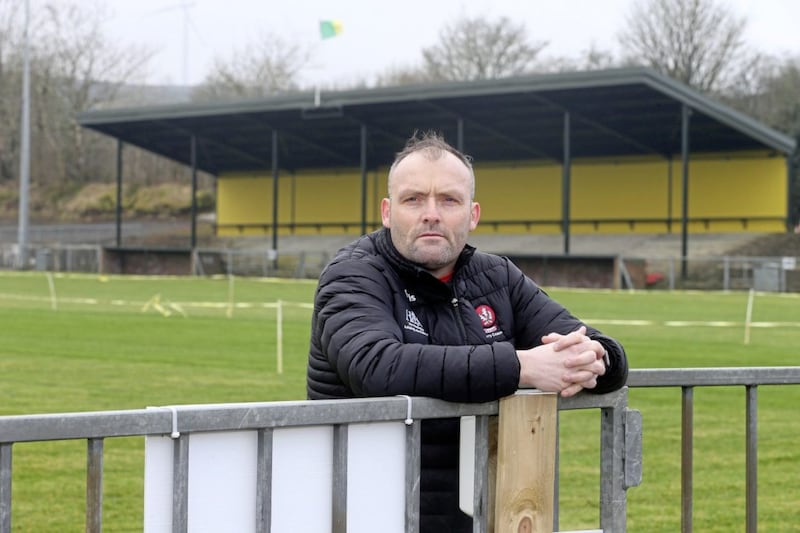
LEANING forward, Bradley wants to make one thing clear: he would sit down and chat with any of the Derry managers he had.
Elite changing rooms are tough, ruthless places.
Bradley played arguably his best football under Paddy Crozier. Derry had some great days during the Crozier years of the mid-Noughties - a Division One title, big Championship wins and a couple of Allstars to boot.
The Ballymaguigan bowed out at the end of the 2008 season and was replaced by ’93 All-Ireland winner Damian Cassidy.
The Bellaghy man had been round enough corners than some of the class of ’09 had birthdays.
A shrewd operator, a Coleman disciple and one of the most cerebral footballers the county had ever produced.
With the creeping advancement in defensive strategies, Cassidy wanted Derry to be less reliant on the two Bradleys.
One night at training he chatted to Gerard O’Kane, a club-mate of the two Bradleys.
‘Hey, Gerard, you kick a wile lot of ball to Eoin and Paddy,’ Cassidy said.
‘Well, those boys run a wile lot,’ replied O’Kane.
“I was taken aback a bit by the conversation,” O’Kane recalls.
“It’s not as if I looked up and saw another forward running – ‘Deets’ or Paul Bradley - and didn’t pass it to him. If I got the ball in and around half-back or midfield, Paddy would’ve known my passing range because I was passing to him for 10 years at that point.
“I knew where Paddy and Eoin were going to run. Not to sound cheesy, but there was a bit of telepathy about it.
“I could understand why Damian was asking me. He didn’t say not to pass to the Bradleys but he was probably probing me a wee bit to tease out a Plan B. I remember he toyed with different midfield combinations as Fergal [Doherty] was struggling with injury as we couldn’t always rely on him.”
Bradley was miffed by the insinuation and from there a tension developed between manager and player.
On away trips, Bradley always roomed with his close friend Kevin McCloy. But Cassidy decided to change room partners.
In his first season (2009), Cassidy guided Derry to a famous win over rivals Monaghan at Celtic Park that became known as ‘The Battle of the Bogside’.
Bradley was still Derry’s main marksman, hitting a monster 2-8 upon the back-door sequel with Monaghan later that summer.
But there were off-field stresses too that few people knew about.
“Ciara got pregnant. Her mother and father were very religious and people assumed Damian and I had a fall-out. The likes of Joe Brolly and Enda Gormley were ringing me saying: ‘You need to get back.’ They didn’t understand the situation. Ciara and me broke the news to her parents.
“Everything was grand, I got the head cleared and came back for the back door game against Monaghan.”
Despite those couple of years not being a vintage period for Ulster teams, Derry couldn’t capitalise.
After suffering a Championship defeat to Armagh in 2010, he was dropped for the Round One Qualifier with Carlow.
“I had a poor game against Armagh, no doubt about it,” Bradley says.
“There was a break to the back door but we were training with nine or 10 men. I was going mad. I trained my balls off, doing extra sessions and was really looking forward to making amends.
“The Thursday night before the Carlow game, Damian approached me at training and said: ‘I’m not starting you at the weekend.’
“And I said: ‘What do you mean you’re not starting me? Who are you starting?’
‘I’m just not going with you.’
‘I’m not accepting it.’
“And I walked away. Damian will have his take on it and I have mine. Maybe I should have bit my lip, bided my time, came on against Carlow and done the business. Maybe that’s what Damian was looking from me. It was a massive regret that I missed the rest of that year.”
Probably the overarching regret Bradley carries from his playing days is the amount of work he put in wasn’t reflected in winners’ medals.
In 2007, at the fifth time of asking, he won his much-deserved GAA Allstar, the same year Glenullin won a championship, while also scooping numerous Irish News Ulster Allstar awards during Armagh and Tyrone’s peak years.
But if you ask him to sift through the years, 2005 is one he winces quite hard at.
He’d no intention of drinking at his friend’s birthday party a week before an All-Ireland Qualifier against Laois. But one pint led to a few more. Turned out he wasn’t in the best shape for the following morning’s training session.
“I was drinking a week before a Championship game. It’s the first and last time it ever happened.
“Everybody knew I was drinking. That type of thing was going on regularly. I’m not justifying what I did. I’m not without fault, I’m not without regret. I was captain of the team. It’ll forever stick with me as one of my biggest regrets.”
Far from the media’s glare, few worked harder at their game than Bradley.
Heading to training one night, O’Kane cites a conversation with Paul O’Hea of Steelstown, a player who was around the Derry senior panel in ’07.
He’d watched Bradley from afar and knew how good he was, but came to have a deeper appreciation of his craft.
“Paul couldn’t believe it,” O’Kane says. “He said: ‘Paddy is the first man there every night and the last man standing with a bag of balls after training. Why are people giving off about him?’
“[Kitman] ‘Bandy’ McGuigan used to have to wait on him until he finished practising his frees every night. He didn’t get that good just by luck.”
A cruciate injury robbed him of an Ulster final appearance in 2011 when John Brennan took charge and 2012 was when the music stopped. There were definitely a couple of encores he never got to play.
“Da always gave me serious belief from a young age,” he says. “I was very lucky to play under very good managers too. When you knew you had the stamp of approval from the likes of Adrian McGuckin, Eamon Coleman, Da…
“I always believed in my own ability, even after a bad game – and I had plenty of bad games. I was in that gym; I was on that pitch. You obviously need a certain amount of talent to play county football but you need the hard work too. I worked hard at my game.
“For years I didn’t have a right foot. Then I realised, around the mid-Noughties, that I needed a right foot and I began scoring regularly with it. I just wanted to be better.
“I was out on the pitch with a bag of balls, I was out running, doing sprint work. I’d really good players around me too. For that four or five years, to play alongside Enda [Muldoon]; he nearly let me run around him.
“I watched football; I listened to men talk about football. Dermot McNicholl and me would talk regularly.
“Whenever I was growing up all I wanted to do was watch football, watch players in my position. I used to watch Canavan regularly. Where does he run? You never stop learning.
“Was I greedy? I wouldn’t have said say so. Put it like this, over the course of my career, most times I got the ball, the only thought was in my head was to take the man on. Did it serve me well? Did it serve the teams I played for well?
“Generally it did. It wasn’t because I was thinking to myself: ‘I’m not giving it to that boy. I’m gonna take my own score.’
“I was doing what I was coached. ‘Get at your man, get inside or outside’… Mistakes weren’t called out as much in my day.
“Nowadays everything is highlighted. I use video analysis but I think it’s over-used. I do know different county managers and club managers who have men sitting in rooms for an hour at a time.
“My video analysis would be 10 or 15 minutes at a time because I think players switch off, and if you do over-analyse I think players stop taking risks. Taking risks is being coached out of the game.
“You look at Eoin, the maverick. Eoin gets heavily criticised for some of his choices in games but he wasn’t afraid to have a go, and people will remember him for the way he played. No fear. Go at a man. Great goals. Great scores…”
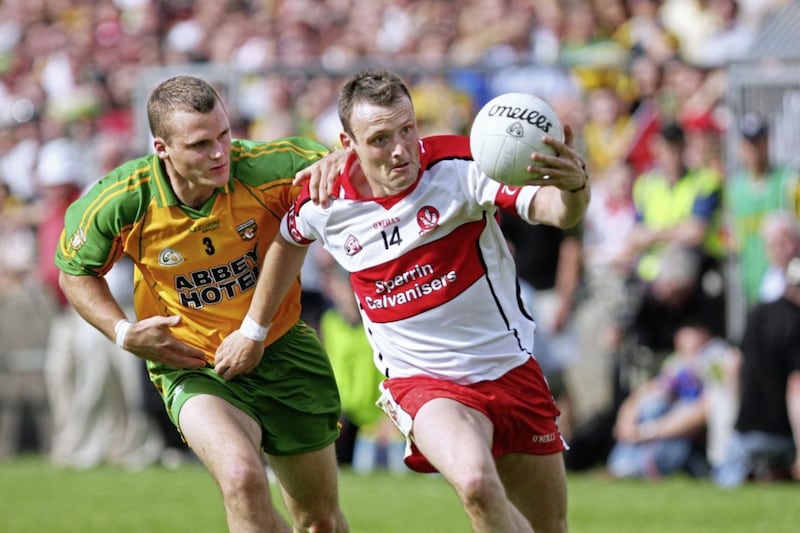
THE afternoon light is beginning to fade. Three hours have gone by in a blink of an eye. With four kids in the house and each of them quiet as a mouse, you can tell Ciara runs a tight ship.
But it’s time to release Ulster football’s top scorer back to his home-life to enjoy the rest of his lockdown Saturday.
How would he want to be remembered?
Repeating the question, he says: “How do I want to be remembered? Someone who was a good forward, scored heavily, and wasn’t afraid to take responsibility…”
They don’t make players like Paddy Bradley anymore.
From the lofty view of the press box for a decade-and-a-half, the Glenullin man was an exhilarating presence on a football field, a stubborn reminder that class never dies.
He didn’t need more medals to validate his greatness. That was a given from an early age.
Derry's U20s and the Loup are in the best of hands.
